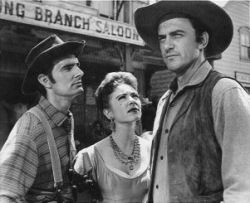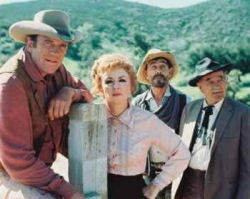
SYNOPSIS
The few
Westerns seen on TV during the early 1950's starred old-style movie heroes such as The Lone Ranger
and Hopalong Cassidy,
and had little to do with the real West. Westerns were considered another form
of obvious fantasy, strictly for the kids. Two shows,
Gunsmoke
and The Life and Legend Of
Wyatt Earp, changed all
that. These two programs, which premiered during the same week in 1955, introduced the
"adult Western" to TV, and begun an enormous wave of Westerns on TV
over the next ten years.
Gunsmoke had its genesis on CBS radio in
the spring of 1952, with William Conrad in the role of
the resolute, determined Marshal Matt Dillon. Conrad, who later became TV's
Cannon
in the 1970's, remained the radio voice of Matt Dillon for a total of nine years, but when
CBS decided to add a video version of the series the first choice for the role was John Wayne. Wayne
would probably have done very well in the role, but did not want to commit
himself to the rigors of a weekly television series and suggested James Arness, a young,
relatively
unknown actor friend of his. Wayne even offered to introduce the program's first
episode, an offer which was quickly accepted by CBS brass. James Arness, six feet
seven inches in height, was even bigger physically than John Wayne, and he proved to be
perfect casting for the role of the heroic marshal.
Gunsmoke was set in Dodge City, Kansas; the year, arbitrarily, was 1873
(according to producer John Mantley). Crusty old Doc Adams, the only cast
member besides Arness to stay with the show for its entire run, was
the town's kindly, sympathetic physician. Doc spent most of his spare time, as
did many of Dodge City's residents, at the Long
Branch Saloon, which was owned and operated by Kitty Russell. Kitty was
extremely softhearted, beneath what could be a very business-like exterior, and would
have willingly become romantically involved with Matt. In the radio
version the implication was that she was a prostitute, but on TV Matt and
Kitty exchanged no more than smiles. Matt's
loyal, well-meaning sidekick was Chester Goode, who walked with a pronounced limp,
talked with a twang ("Mister Dillon!"), and brewed a mean pot of coffee - which was
often seen behind the closing credits.
Gunsmoke
was not an immediate hit. It premiered on Saturday night against the established
George Gobel Show
and did not make TV's top 15 during it's first season. In its second year it
jumped to No. 8, however, and for the next four years - 1957 to 1961 - it was
the top-rated program
in all of TV. Gunsmoke precipitated a deluge of Westerns in the late
1950's (at one time there were more than 30 prime-time network Westerns on in
the same season), but it outlived them all. It went into a considerable decline in the mid 1960's,
after being expanded to an hour, and was about to leave the air when CBS gave it one
more chance, moving it to Monday night in 1967. The result was a stunning
comeback that put the show in the top ten once again, where it stayed well into the
1970's. It is ironic that when it finally did leave the air in 1975, it was the last Western
left on network television at that time. In all, Gunsmoke
ran for 20 years, longer than any other prime-time series with continuing
characters in the history of the medium.
Over
the years there were changes in the supporting cast. Chester (Dennis Weaver) left in
1964 to be replaced by Festus Haggen, the scruffy, illiterate hillbilly deputy
who remained for the rest of the run. Half-breed Indian Quint Asper was featured
for a while as the town blacksmith, as were gunsmith Newly O'Brien and Matt's
young friend Thad Greenwood.
In
addition to the principal cast members, there was an extensive supporting cast
of Dodge City residents who appeared from time-to-time. Miss Hannah ran the Long Branch Saloon after Kitty's
departure. Jones
and Lathrop were storekeepers; Halligan and O'Connor, local ranchers; Louie,
the town drunk; Barney, the telegraph agent; Howie, the hotel clerk; Percy, the
Dodge City undertaker; Hank,
the stableman; Nathan, the freight agent; Mr. Bodkin, the banker, and Ma Smalley, the boardinghouse owner. For a couple
months in 1971, John Chapman served as the town physician (while actor Milburn
Stone was recovering from a heart attack).
As
the years passed, less and less was seen of Matt. Stories
often revolved around other members of the cast while he was out of town, and,
to some extent, Gunsmoke frequently
resembled an anthology as stories often came to center on guest stars, using
Dodge City simply as a background. "Hard" social issues of the 1960's, such as
the rights of minorities, social protest, and crimes such as rape, began to be tackled in
stories adapted to the Dodge City setting.
Matt Dillon set the tone of the show throughout its long life,
however, standing up for
justice, sincerity, and truth. The opening of the show (during its early
seasons) said it all. There was
Matt in a fast-draw show-down in the main street of Dodge City. The other man
fired a fraction of a second faster, but missed completely, while Matt's aim
was true. Matt could be beaten up, shot, and ambushed, but that indomitable will
would never be defeated.
For
the first three seasons following the expansion of Gunsmoke
from half an hour to a full hour on Saturday nights, CBS aired reruns of the
original half-hour version on Tuesdays under the title Marshal
Dillon.













